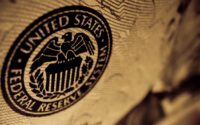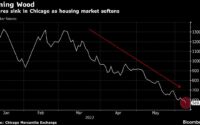Key part of yield curve inverts, blaring recession warning
FOX Business’ Susan Li and Constellation Research founder Ray Wang weigh in, with Wang noting that overall, the U.S. economy is ‘very strong’ despite the Russian invasion of Ukraine, inflation and interest rate hikes.
A closely watched recession predictor in the bond market just flashed red, spurring fresh concern that the U.S. economy is on track for a downturn this year.
The spread between the 2-year and 10-year Treasury yields inverted on Tuesday for the first time since 2019 on fears that the Federal Reserve’s aggressive approach to tackling the hottest inflation in four decades could lead to a sustained slowdown in growth.
FED RAISES INTEREST RATES FOR FIRST TIME IN 3 YEARS, PROJECTS 6 MORE HIKES AS INFLATION SOARS
Yields on the 2-year Treasury note climbed as high as 2.387% rising above those on 30-year bonds (which fell to about 2.383%). The yield curve inverted again on Wednesday, with 2-year notes hitting 2.377% and 10-year notes falling to 2.334%.
The spread between the 5-year and 10-year Treasury, as well as the 2-year and 30-year, inverted earlier this month.
Yield curve inversions, which are rare, are viewed as a good recession predictor because it suggests that investors believe – with the interest rate on long-term bonds lower than the rate on short-term bonds – economic growth is slowing.

Customers browse food stalls inside Grand Central Market on March 11, 2022 in downtown Los Angeles, California. ((Photo by Patrick T. FALLON / AFP) / Getty Images)
“Markets are fixated on the U.S. Treasury yield curve as it is considered an excellent gauge of the economy,” said Anu Gaggar, global investment strategist for Commonwealth Financial Network. “If the economy is healthy and growing, longer-term Treasury rates should be higher than shorter-term rates. When the reverse happens, concerns start to mount about the future state of the economy.”
Every recession in the past 60 years was preceded by an inverted yield curve, according to research from the Federal Reserve Bank of San Francisco.
Still, some experts cautioned that the brief inversion does not necessarily mean a recession is imminent. Joe Brusuelas, chief economist at RSM, said fears of an immediate downturn are “somewhat overblown,” though he acknowledged there are risks of a downturn.
INFLATION TOPS AMERICANS’ BIGGEST ECONOMIC CONCERNS, GALLUP SURVEY SHOWS
“Economic fundamentals show that the probability of a recession over the next 12 months is roughly 20%, which is up modestly compared to before Russia’s invasion of Ukraine,” he said.
The bond market movement comes as the Fed takes a more hawkish approach to fight inflation: Policymakers raised rates by a quarter-percentage point two weeks ago, and have since signaled support for a faster, half-percentage point increase at their May meeting.
“If we conclude that it is appropriate to move more aggressively by raising the federal funds rate by more than 25 basis points at a meeting or meetings, we will do so,” Chairman Jerome Powell said last week during an economics conference. “And if we determine that we need to tighten beyond common measures of neutral and into a more restrictive stance, we will do that as well.”

Federal Reserve Chair Jerome Powell arrives to speaks at a news conference after the Federal Open Market Committee meeting, Wednesday, Dec. 11, 2019, in Washington. ((AP Photo/Jacquelyn Martin) / AP Newsroom)
The Labor Department reported earlier this month that the consumer price index rose 7.9% in February from the previous year, marking the fastest increase since January 1982, when inflation hit 8.4%. The CPI – which measures a bevy of goods ranging from gasoline to health care – rose 0.8% from January.
Some economists believe the Fed waited too long to confront the burst in inflation, while others have expressed concerns that moving too quickly to stabilize prices risks triggering an economic recession. Hiking interest rates tends to create higher rates on consumers and business loans, which slows the economy by forcing employers to cut back on spending.
GET FOX BUSINESS ON THE GO BY CLICKING HERE
Still, Powell has pushed back against concern that an inverted yield curve signals the economy is headed for a recession and maintained optimism that the Fed can strike a delicate balance between taming inflation without crushing the economy.
“The probability of a recession in the next year is not particularly elevated,” Powell told reporters two weeks ago, citing the strong labor market, solid payroll growth and strong business and household balance sheets. “All signs are that this is a strong economy, and one that will be able to flourish in the face of less accommodative monetary policy.”
[ad_2]
Source link


